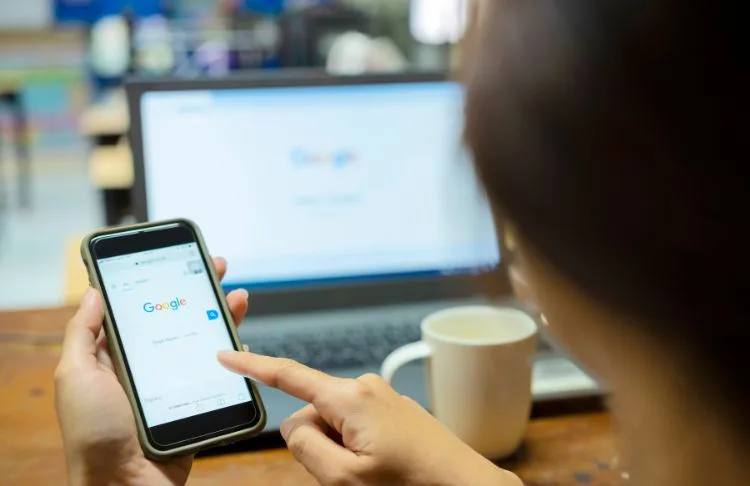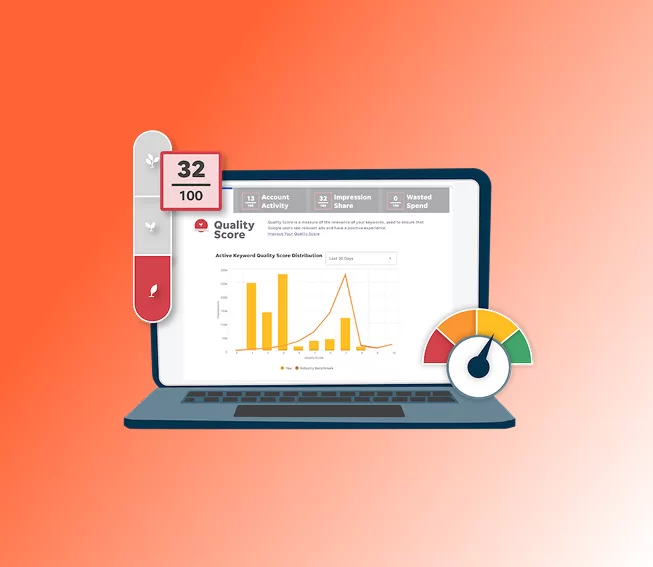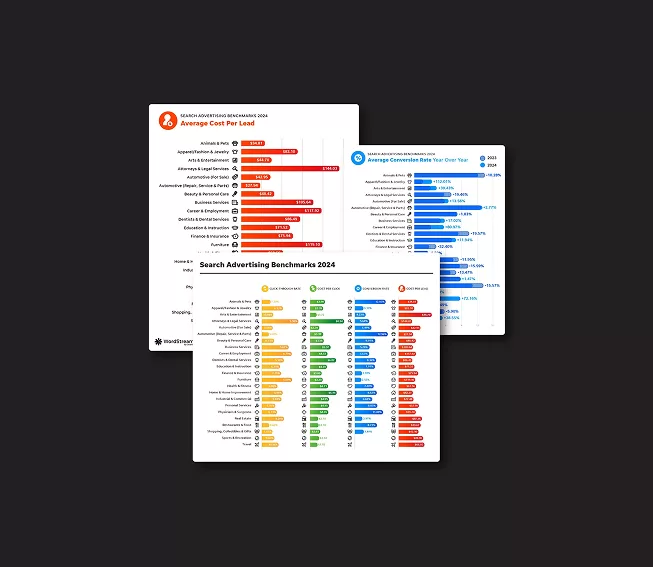If you’ve ever Googled anything, you’ve undoubtedly seen ads atop your search results. Maybe you’ve wondered, “How do those ads get there? Are they effective? How do you pay for a Google ad and how much do they cost? Should you consider investing in similar ads for your business? If yes…how?”

If you’ve ever wanted your business to show up at the top of Google search results, keep reading.
It’s called PPC advertising and it’s actually a pretty simple process once you understand the basics:
- PPC = Pay Per Click
- CPC = the Cost Per Click
If you’re looking for an in-depth explanation of CPC and how it ties into ads, PPC, and search engines like Google, look no further.
What is cost per click (CPC)?
Cost per click (CPC) is the amount you pay each time someone clicks on your ad. It’s the metric that tells you how much your Google Ads cost.
In PPC (pay-per-click) advertising, you bid on keywords that are relevant to your business and target audience. When someone searches for that keyword, they see your ad atop that search results page on the search engine you’re advertising on (like Google or Bing).

Rather than the set fee of “$X per month” that you might pay for an old-fashioned billboard or magazine placement, you simply pay for each click that your ad drives onward to your site.
For example, let’s say that you own a coffee shop in Park Slope, Brooklyn, and your marketing team has identified that 20,000 people per month who live in that area Google the term “coffee shop near me.” If you want to be at the top of the results for that page, it might be a good idea to invest in an ad to be placed at the top of the page they all end up on. From there, you would only pay each time a person clicked on your ad.
CPC ad types
There are a variety of advertisements, including text and rich media, that use cost per click to determine how much the advertiser will pay.
Some ads only appear on certain networks. For instance, ads at the top of Google’s search results are called “Search Network” ads, and image-based ads you see on websites, like YouTube, are called “Display Network” ads.
Cost per click plays a role in the following ad types:
- Text ads
- Video ads
- Image ads
- Shopping ads
- Facebook/Instagram ads
- Twitter promoted tweets
- LinkedIn ads
Why is CPC important?
CPC is a hugely important metric for PPC. It helps you determine how much you’re paying for each click on your ad. The higher the cost per click, the more expensive your ads are to run.
If you’re advertising a product or service that’s already established, having a high CPC can be fine because you know that people who click on your ad will likely convert into sales—but if you’re trying to promote something new, having a high CPC might not be helpful because it could mean that you’re paying too much money for low-quality traffic.
The factors that determine CPC
It’s important to understand that the cost per click of an ad is based on a number of factors. It’s not just about how much you bid per click; it’s also about how relevant your business is to the intent of that search, and how competitive the search you’re trying to rank for is.
If all it took were a willingness to spend money to be at the top of any search result you wanted, people would abuse it.
As an (extreme) example, imagine a wealthy person had a bad experience with a coffee company and wanted to start a smear campaign against them.
Anytime someone would search for the term “how to buy (this brand’s) coffee,” they could see an ad saying “why you should NEVER buy (this brand’s) coffee!” If that wealthy person really wanted to do that, theoretically they could, right?
Wrong.
From Google’s perspective, even though that wealthy person might be willing to spend money to be there, the negative ad they’d want to display would not match the user intent that people would be searching for that term. If someone’s searching for “buy (this brand’s) coffee,” presumably what they want to see is a way to do that, not to read someone’s negative opinion on why they shouldn’t.

Ad relevance is an important factor in search advertising, which we’ll cover more shortly.
That said, even if your product IS completely relevant to the ad but you’re getting a lot of impressions and not many clicks, it might be because the current cost-per-click rate is higher than what you intended to spend, or someone else who is equally relevant is simply outbidding you.
The CPC pricing structure works well for advertisers who want to target specific niche audiences and can pay for the attention of the right customers.
Plus, it allows advertisers to limit their ads to only show in specific geographic regions or languages, helping ensure only the right audience will see your ads.
In addition to the likelihood that the search will convert into a sale, there are other factors that determine how much per click an advertiser will have to pay to be featured.
Here are the factors that determine CPC:
Max bid
Your max bid is how much you’re willing to pay when someone clicks on your ad. The higher your max bid, the more likely it is that your ad will show up at the top of the page when users search for keywords related to what you’re selling.
Related: Find out how to do PPC keyword research.
Quality Score
Google uses a score between 1 and 10 to determine how relevant your landing page is to what people are searching for. This directly impacts your cost per click and is determined by how relevant your keyword is to the landing page the ad directs to, how well the page converts, and the percentage of people who click through from the ad onward to the landing page (this is called the click-through rate, or CTR).

It’s important to note that if you maintain a high Quality Score and high Ad Rank (which we’ll talk about next), you can outrank those who have higher bids than you.
What does that look like? If you want your ad to appear atop a desirable page of Google search results, you’ll need to be sure that your landing page meets Google’s guidelines for quality content.
These include:
- Expected clickthrough rate (CTR): The likelihood that your ad will be clicked when shown.
- Ad relevance: How closely your ad matches the intent behind a user’s search.
- Landing page experience: How relevant and useful your landing page is to people who click your ad.
Ad Rank
Google will factor in your max CPC bid and your Quality Score to determine your Ad Rank. Your Ad Rank can impact your average CPCs over time as the lower you rank, the less likely you’ll be to get more clicks that offset costs. After all, it’s been proven that ads that rank as the first ad on the page get substantially more clicks than those lower on the page.
How is cost per click calculated?
Now that you know all the factors, it will be easy(ish) to understand how cost per click is calculated. The general formula used to determine the rate you pay per click is simply Advertising Campaign Cost divided by the Number of Clicks, but it’s rarely that simple.
Google Ads uses a bidding process to set its rates. For instance, you tell Google Ads the most you’re willing to pay per click. They then use a formula involving Quality Score and your maximum bid to decide if they should show your ad or someone else’s.

This means that the platform ranks your bid, ad quality, position, and user signals to determine how much you ultimately pay per click. You can choose your Max CPC bid manually or enable Google’s automated bidding system. Both options provide opportunities to increase the number of people who click on your advertisement—depending on your overall strategy.
What’s an average CPC?
As with most things in marketing, it depends.
The cost per click on ads varies widely. For example, Google Ads charges an average of $2 to $4 per click across all industries on the search network, but some keywords can (and do) cost much more.

An important way of thinking about CPC is to consider the intention of the person doing the search. Are they searching for a product or service to spend money on? Or are they simply curious about something and looking for a quick answer?
For example, both of the following queries involve the search “Gluten Free,” yet one costs $7 per click while the other only costs 20 cents. Can you tell why that might be?
The person searching for the high CPC search “gluten-free meal delivery” is someone looking for a paid solution. They’ve clearly expressed what it is they are looking to find, and it’s likely to end up in a transaction.

If a company out there has an option for a gluten-free meal delivery service, it’d be wise to get in front of this person as quickly as possible.
Meanwhile, the person searching for the low CPC search “is soy sauce gluten-free,” is likely just looking for an answer to their question. There’s little reason for a company to want to spend money being atop that search.

Perhaps a soy sauce company might want to advertise their brand to the person asking this question, but considering they’re just asking about soy sauce in general and not a specific brand, it’s unlikely to be worth their investment.
As a general rule, the less likely that a search will turn into a high-value paid transaction, the more affordable it will be to advertise “per click” on that search.
How to lower cost per click
Here are some ways to keep your CPC low when running PPC ads.
1. Bid on long-tail keywords
When you want to reduce your cost per click, a good place to start is by analyzing the keywords you’re bidding on. Long tail keywords are generally phrases that contain 4 or more words. In general, the more words are typed in a search, the more likely the person knows what they’re looking for.
Long-tail keywords have less competition and usually cost less than their broader, shorter counterparts. The downside is that you will have fewer overall visitors, but the upside is that because they are so specific, they will be more likely to save you from having to overpay per click.
2. Utilize match types
Google Ads has three important ways to match keywords: broad match, phrase match, and exact match types
Broad match: If your ad was for an “Android Phone Case”, you’d be trusting Google to show your ad on similar search “Android Case” and “Google Pixel Case” searches that might apply, but you didn’t specify yourself.
Phrase match: This might show your ad on “Android Phone Case Waterproof” or “Best Android Phone Case”. It uses the same phrase, but the search involves other words as well.
Exact match: This would only qualify you to show up when someone searches the exact phrase you asked to be shown for, “Android Phone Case”

3. Use negative keywords
This feature allows you to exclude your ads from specific searches. By telling them specifically what NOT to show you for prevents unwanted ad spend and helps ensure only you’re paying only for the right people’s clicks.
Learn more about negative keywords here.
4. Lower your keyword bids
Yes, your keyword bids affect how high your ad will appear on the search engine results page. But you can save money by placing your ad in second, third, or fourth position—and still reach potential customers at a much lower cost!
CPC is an important factor in PPC advertising
The role that CPC (cost per click) plays in PPC advertising is critical. It’s the way you can determine the amount of money you want to spend on each click, and it’s also a great way to measure how much your campaign is costing you.
The factors that determine your CPC are many and varied, but they mostly boil down to how much competition you have for your keywords and what kind of ad copy you’re using. If someone is bidding against you who has a better quality score than you do, they’ll probably have a lower cost per click than you do. If someone has better ad copy than you do, they will also be able to get more clicks at a lower cost per click.
If you’re looking for more information on CPC, check out our guide on How to Tell if Your PPC is Working!






